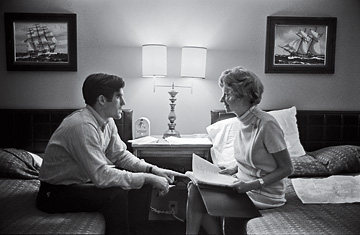
On the campaign trail during his mother's Senate bid, Mitt and Lenore strategize in a hotel room
(4 of 11)
Scott, the oldest son, chafed under his father's near total authority; Mitt took his mother's lead and maneuvered around it. "In my experience with him, Mitt would never directly confront his father," Grasman says. "He would use a sense of humor to deflect that tempest blowing his way." Braithwaite-Brickley describes a car ride she took in Michigan's Upper Peninsula with Mitt, then 15, holding the map. He chose a route that crossed a lake, and his mother chided him that they couldn't drive that way without a bridge. "Oh, that's right," he said, alluding facetiously to Jesus' walking on water, "Dad isn't here!" "It was cute and funny, acknowledging how people saw George Romney and maybe how he saw himself," says Braithwaite-Brickley.
That was in 1962, the year George committed himself fully to politics. It was far less common then for wives to campaign separately, but Peterson, an experienced Michigan politician, began describing Lenore as George's "secret weapon." Lenore was witty and warm, with an incandescent smile. It did not hurt that she was "a very, very beautiful woman," Fletcher recalls, with the stage presence to "walk into many situations and have the crowd eating out of her hand." In one of her earliest speeches, that June, she deftly placed herself alongside her husband when a famous columnist predicted a grisly fate. "The reporters--Stewart Alsop, different ones--have said to me, 'You're going to be torn into shreds,'" she told a women's group in Lansing. "'They're going to cut your husband up into little pieces.' I don't believe it. If we're that kind of people that can be torn and cut to shreds, then we shouldn't be here. If we don't feel that there's something greater than us at stake, then we shouldn't be here."
Alsop was mistaken--that year.
The Challenges She Faced
George won his first race for Governor, and Lenore performed the role of first lady with panache. Her calendar filled with ceremonial visits to schools and clubs and women's teas--but never on Sunday, "the day we reserve for our church activities and family." Lenore did not hesitate to take sides in the signal controversies of the 1960s. Race relations, civil rights and urban blight consume hundreds of pages in her private papers, archived at the University of Michigan's Bentley Historical Library, and many of her views were to the left of her party. She called publicly for desegregated housing, expansion of welfare and new investment in inner-city schools. She emphasized rehabilitation alongside punishment for criminals. Privately, though not yet in public, she expressed doubts about the Vietnam War. Invited to give testimony at Brigham Young University in January 1964, "Sister Romney" used the prophecy of Joel 2: 28 ("Your old men shall dream dreams, your young men shall see visions") as a bridge from religious to temporal affairs. "We have seen bombings in Alabama, little girls blown up in Sunday school," she said, describing a litany of ills from juvenile delinquency to the Berlin Wall. "We pay $20 billion a year for crime and we do not bat an eyelash. We spend $10 billion for education and we scream to high heaven."
